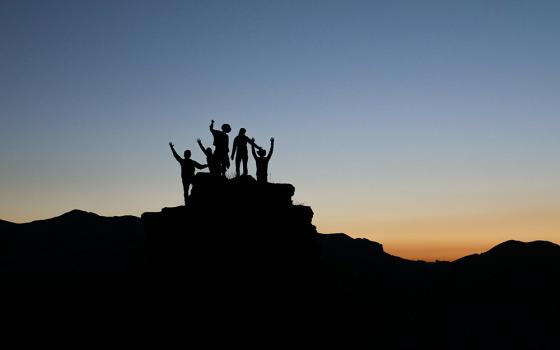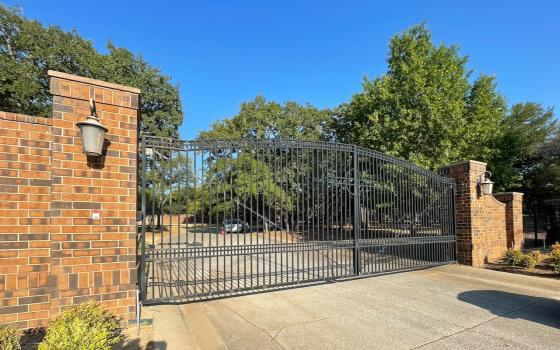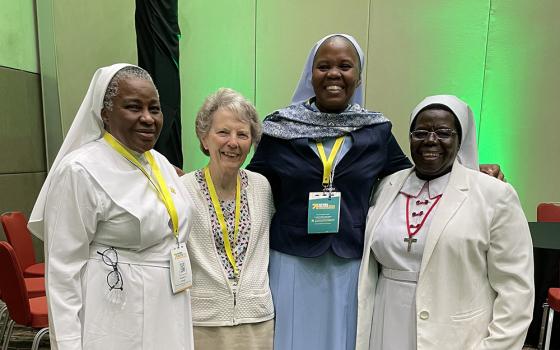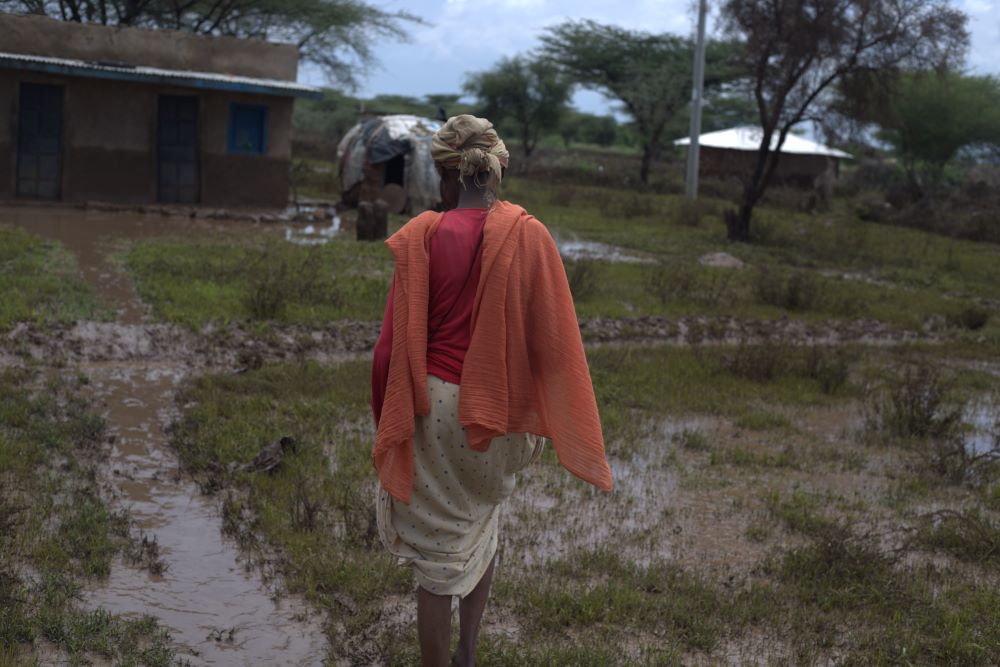
Alice Lobali returns to her home to check if any household items were spared when raging floods filled her house Nov. 6. Hers was among hundreds of families that night who sought refuge at Mary Immaculate Catholic Church after flooding in Samburu, Kenya. (GSR photo/Doreen Ajiambo)
Sitting with some of her grandchildren outside their new home in this northern Kenyan region, Alice Lobali is grateful to be alive after her neighbors rescued her Nov. 6. Raging floods had engulfed her village, causing extensive damage to homes, livestock and infrastructure.
The 83-year-old was asleep when it started raining. "All of a sudden, water came rushing inside the house, and before I knew it, the whole place was flooded, and I started screaming," said the mother of three. Her scream alerted neighbors, who came and rescued her and her eight grandchildren. "Since it was in the middle of the night, we sought shelter in the nearby church," she said.
Lobali was among hundreds of families that night who sought refuge at Mary Immaculate Catholic Church in Archers Post — a settlement in Samburu, where religious sisters have been providing temporary shelter to flood victims and distributing food, medicine, clothes, water and other essential supplies.
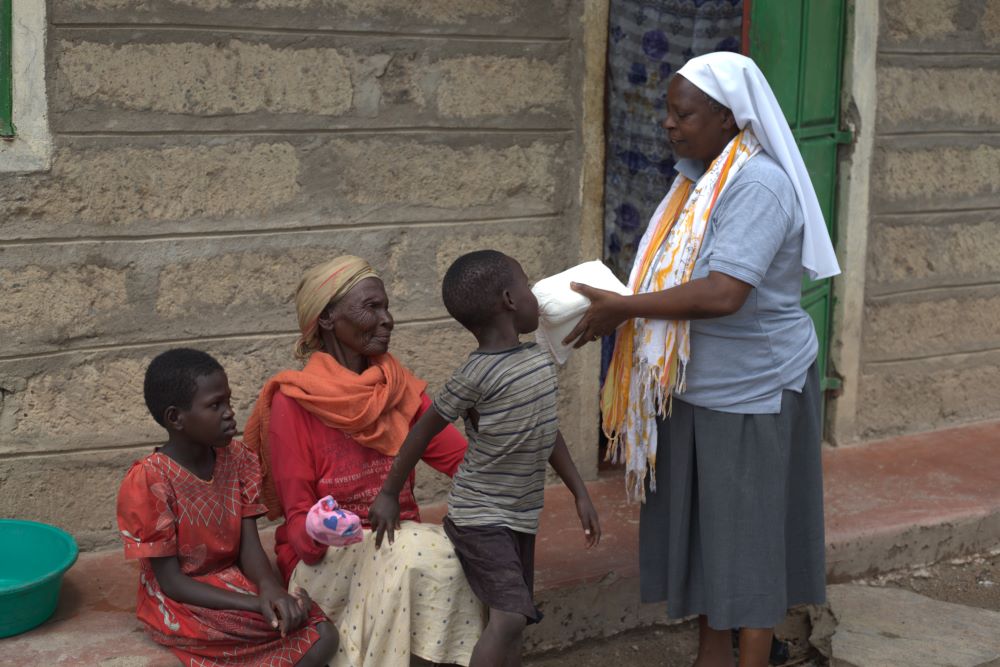
Sr. Milika Mary Wanjira Mugwe of the Little Servants of the Sacred Heart distributes maize flour to Alice Lobali and other flood victims on Nov. 9, in Samburu, a region in northern Kenya. Experts say the floods and heavy storms are likely to last until April 2024. (GSR photo/Doreen Ajiambo)
"After staying in the church compound for a few days, the sisters came to my aid and rented me a small house to stay with my grandchildren," said Lobali as she received maize flour from the sisters at her new residence. "Since the floods started, people here have been taking refuge at the church, and it's now congested."
The floods and heavy storms caused by ongoing El Niño rains started in early October and are expected to last until April 2024, according to the World Meteorological Organization. The organization said the increased rainfall results from El Niño conditions in the Pacific Ocean and a positive Indian Ocean dipole.
El Niño conditions, characterized by a significant increase in sea surface temperature over the eastern and central equatorial Pacific, occur every two to seven years, the WMO said. The Indian Ocean dipole is a climate pattern related to sea surface temperatures in the Indian Ocean.
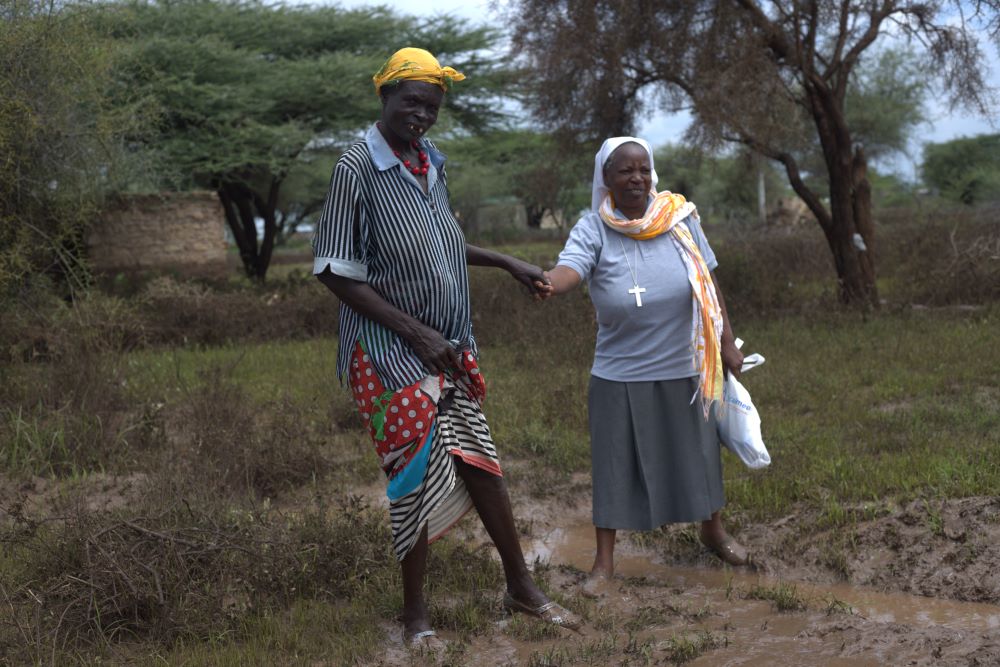
Sr. Milika Mary Wanjira Mugwe, of the Little Servants of the Sacred Heart, visits families still stuck in their homes after floods in Kenya destroyed properties, displaced thousands and killed at least 46 people. (GSR photo/Doreen Ajiambo)
The flash floods, heavy rains and increasing river levels have already killed 46 people and displaced thousands more across the East African nation of more than 54 million people, according to Interior Cabinet Secretary Kithure Kindiki. Heavy floods destroyed markets, homes, crops, roads and bridges, schools, hospitals, and places of worship, disrupting the lives of thousands of people.
"I want to appeal to Kenyans not to take chances when it comes to flood waters," Kindiki warned on Nov. 14. "When our officers tell you to evacuate from flood areas, please comply, and if you don't, we will force you so that we can save lives."
Heavy rains have also severely affected neighboring countries of Burundi, Ethiopia, Somalia and Malawi — killing dozens, destroying homes and properties, and displacing millions of people. In Somalia, for example, the floods caused by torrential rainfall have killed more than 30 people, displaced about half a million people and disrupted the lives of more than 1.2 million people, according to Minister of Information Daud Aweis.
Meryne Warah, global organizing director for GreenFaith, demonstrates at the COP27 climate summit in Egypt’s Sharm el-Sheikh held Nov. 6-20, 2022. (GSR photo/Doreen Ajiambo)
Sr. Milika Mary Wanjira Mugwe said Kenyans, especially those in the northern part of the country, have experienced extreme weather events for decades. The nun noted that a few months ago, the region was experiencing the worst drought in more than four decades, leaving millions of residents facing extreme hunger. However, she said, the situation has now taken a dramatic turn, with floods displacing thousands of people, killing livestock and sweeping thousands of acres of agricultural farmland.
"Climate change is impacting the people of northern Kenya because they suffer every year due to climate change," Mugwe, a member of the Little Servants of the Sacred Heart, told Global Sisters Report. "We have a feeding program for the people here year in and year out, and the situation has always stayed the same. During drought or floods, people desperately come to our convents or churches to ask for food and other essential items."
Mugwe's sentiments are supported by climatologists who say the country's current situation reflects global warming. Experts noted climate change is causing more frequent and severe weather events worldwide, including in Kenya.
"Climate change is a big problem to Africa because of industrial agriculture," said Meryne Warah, global organizing director for GreenFaith, explaining that industrial agriculture contributes up to 25% of greenhouse gas emissions, a situation not unique to Africa. "Greenhouse gasses are causing climate change in Africa and the rest of the world and adversely affecting people and biodiversity."
El Niño rains are hitting the African countries as world leaders, including religious leaders, prepare to gather for the UN Climate Change Conference, or COP28, in Dubai, UAE, Nov. 30-Dec. 12. Topics for discussion include the urgent need to assist communities in African countries that are vulnerable to the effects of climate change, as well as solutions to address loss and damage incurred during intense climate-related disasters such as floods, storms, droughts and heat waves.
Africa is responsible for only a fraction of global greenhouse gas emissions but faces the most severe challenges due to climate change. This situation has forced African leaders to work together ahead of COP28. For example, African heads of state and other stakeholders gathered in Nairobi, Kenya, Sept. 4-6 during their first African Climate Summit, where they signed the Nairobi Declaration, solidifying Africa's common position on addressing climate change before COP28 in Dubai.
"The heavy flooding results from the fossil fuel industry, to which Africa contributes very little," Warah said. "The fossil fuel industry is making it impossible for the rain patterns to remain consistent and is contributing to an adverse ozone layer depletion that is causing the rain to become as heavy as it is now."
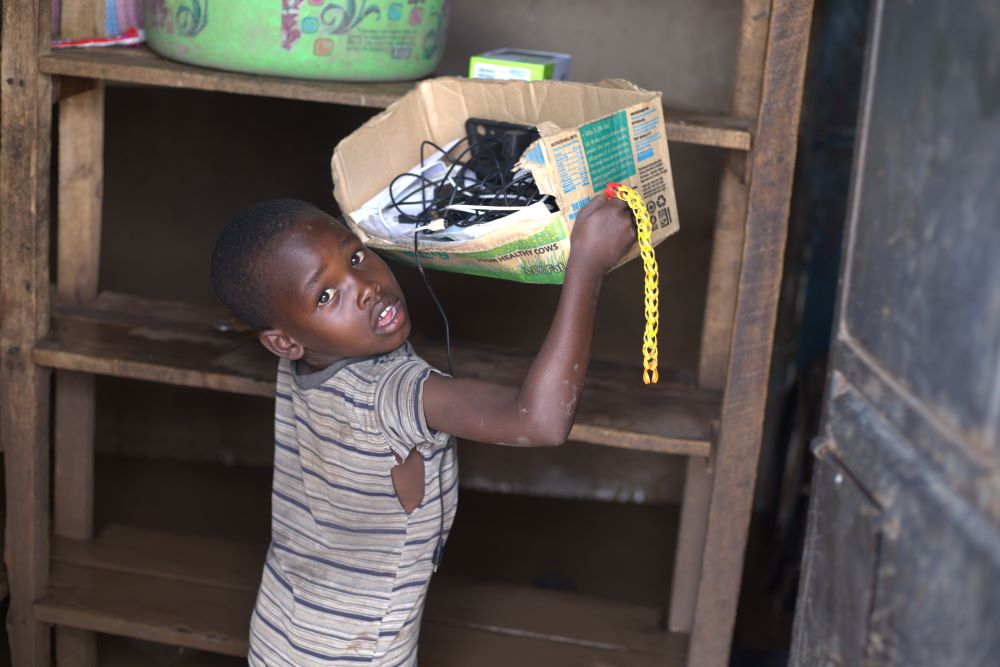
A child returns to his flooded home to pick up a few items that were not swept away by raging floods, which have left more than 46 people dead and displaced thousands of families in Kenya since the El Niño rains began in October. (GSR photo/Doreen Ajiambo)
Meanwhile, religious sisters have stepped up efforts to help flood victims across the country and mitigate the effects caused by El Niño rains and other climate change-related disasters.
Mugwe, the leader of her community in Samburu, said her congregation has always provided housing and support to flood and drought victims in Samburu and other parts of northern Kenya. Before the floods, Mugwe said, residents would come to the church monthly to receive food and other essential items. However, since the floods started, the situation has worsened "because everyone needs help, and that food and non-food items are rapidly running out in their store."
"We are getting worried because the situation is worsening unless we get some aid very quickly to help the victims," she said. "Our clinic here is also receiving a large number of patients who have diarrhea, and we suspect that if this continues, we may get a cholera outbreak."
Advertisement
Sr. Miriam Jacinta Jagogo said the situation was similar in Kisumu, the Kenyan port city on Lake Victoria. The nun and other sisters helping families affected by flooding said the weather had become so unpredictable "that when it's dry, the heat is too much, and when it rains, the floods are excessive due to the effect of climate change."
"Whenever it rains here, we have to come in and help the people. However, we don't always have enough food because many people are affected," said Jagogo, a member of the Franciscan Sisters of St. Anna.
The sisters are addressing the challenges of climate change through an awareness campaign to avoid future shocks. They encourage residents to plant trees and grass, learn how to manage floods, practice sustainable agriculture and take seriously meteorologists' early warnings about impending disasters. The sisters are also urging the government to intervene, help the victims and work on reducing gas emissions.
"The government first needs to build dams that can preserve the water so that when it rains like this, the water has somewhere it can go," Mugwe said. "The dams will also help deal with the drought when it comes. People will have water and also be able to do some farming, too."

